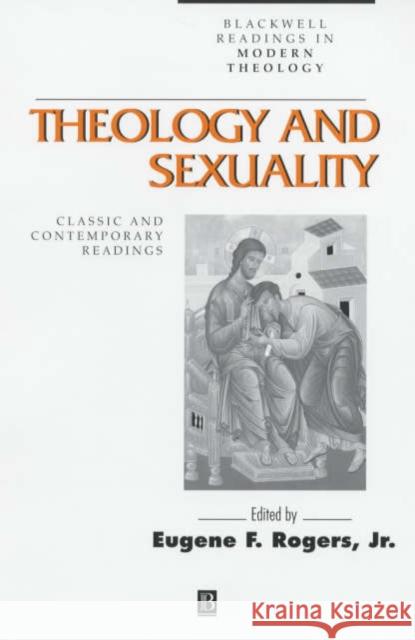Theology and Sexuality: Classic and Contemporary Readings » książka



Theology and Sexuality: Classic and Contemporary Readings
ISBN-13: 9780631212768 / Angielski / Twarda / 2002 / 448 str.
Theology and Sexuality: Classic and Contemporary Readings
ISBN-13: 9780631212768 / Angielski / Twarda / 2002 / 448 str.
(netto: 602,94 VAT: 5%)
Najniższa cena z 30 dni: 614,83 zł
ok. 22 dni roboczych.
Darmowa dostawa!
This much-needed volume draws on a wide range of resources and some of the freshest talent in the field to examine debates about theology and sexuality. Material is drawn from a variety of ancient, medieval, modern and contemporary texts to provide readers with a broad perspective on the issues discussed.
"Sexuality is a bitterly contested territory for many, probably most, Christians these days, and the climate of rather frantic controversy hasn′t encourage a really theological debate. Here is a first–class resource for such debate, not propagandising, but setting out a broad spectrum of reflection on the issues that underlie the sniping of sexual politics – reflection on the meanings of the body itself for Christians, within a richly informed and traditionally literate framework. It is very welcome."
Rowan Williams, Archbishop of Wales and Bishop of Monmouth
"The readings offer thoughtful reflections on the meanings of the body, homosexuality, marriage, and the interpretation of scripture. The book should inform the debate in a helpful way." Church Times
"Those seeking information to guide them around the contemporary debate in the church about sexuality will welcome the publication of Theology and Sexuality." Expository Times
"...a valuable resource for anyone who wants to think through the fundamental questions it poses: ′What does God want with sex, anyway?′" The Way
List of Contributors.
Acknowledgments.
Introduction.
Part I: How and How Not to Think Theologically About the Body.
1. Embodiment in Time and Eternity: A Syriac Perspective. (Susan A. Harvey).
2. The Appeal to Experience. (George P. Schner, SJ.).
Part II: Liturgical Resources.
3. The Celebration and Blessing of a Marriage: from The Book of Common Prayer.
4. The Betrothal Service: from the Service Book of the Holy Orthodox–Catholic Apostolic Church.
5. Order of Second Marriage: from the Service Book of the Holy Orthodox–Catholic Apostolic Church.
6. Office of Same–Sex Union: from Same–Sex Unions in Premodern Europe.
7. Tomorrow Shall Be My Dancing Day: from The Shorter New Oxford Book of Carols.
Part III: Classical Resources.
8. From The Good of Marriage. ( St. Augustine of Hippo).
9. From Homily I on Marriage.( St. John Chrysostom).
10. From Against the Opponents of the Monastic Life.( St. John Chrysostom).
11. Hymns of Divine Love, 15. (St. Symeon the New Theologian).
12. From Commentary on Romans. (St. Thomas Aquinas).
13. From The Spiritual Canticle. (St. John of the Cross).
14. Freedom for Community. (Karl Barth).
15. From The Epistle to the Romans Karl Barth.
Part IV: Contemporary Philosophical Resources.
16. Sexual Perversion. (Thomas Nagel).
17. Moral Abominations. (Jeffrey Stout).
Part V: Nuptial Hermeneutics, Or What Marriage Means.
18. The Crisis of an Ethic Without Desire. Sebastian Moore.
19. From The Original Unity of Man and Woman. (Pope John Paul II).
20. From The Sacrament of Love Paul Evdokimov.
21. Faithfulness. (Robert Jenson).
22. The Relationship of Bodies: A Nuptial Hermeneutics of Same–Sex Unions. (David Matzko McCarthy).
23. Sanctification, Homosexuality, and God's Triune Life. (Eugene F. Rogers, Jr.).
Part VI: Catholic Controversies.
24. Letter to the Catholic Bishops on the Pastoral Care of Homosexual Persons: Congregation for the Doctrine of the Faith.
25. The Pope Converts. (Mark D. Jordan).
26. Alone Again, Naturally. (Andrew Sullivan).
27. Gay Friendship: A Thought Experiment in Catholic Moral Theology. (Stanley Hauerwas).
Part VII: Trinitarian Resources.
28. The Body's Grace. (Rowan D. Williams).
29. Trinitarian Friendship: Same–Gender Models of Godly Love. (Marilyn McCord Adams).
Part VIII: Anthropology and Christology.
30. Sanctifying Nearness. (Thomas Breidenthal).
31. [Logos and Biography]. (John Boswell).
32. [Marriage and Idolatry]. (Charles Hawes).
Part IX: Ecclesial Voices.
33. Disputed Questions: Debate and Discernment, Scripture and the Spirit. (Luke Timothy Johnson).
34. Homosexuality in the Church: Can There Be a Fruitful Theological Debate? (Oliver O'Donovan).
35. Theology Among the Stones and Dust. (James Alison).
Appendix: Biblical Resources.
Scripture Index.
General Index.
Eugene F. Rogers is Associate Professor of Philosophical Theology and Chair of the Program in Theology, Ethics and Culture in the Department of Religious Studies at the University of Virginia, Charlottesville. His previous publications include Thomas Aquinas and Karl Barth (1995) and Sexuality and the Christian Body (Blackwell Publishers, 1999).
This much–needed volume draws on a wide range of resources and brings together a collection of leading scholars in the field to examine debates about theology and sexuality. Material is drawn from a variety of ancient, medieval, modern and contemporary texts to provide readers with a broad perspective on the issues discussed.
Theology and Sexuality takes on one of the most controversial contemporary theological issues, providing new insights into Christian arguments about the body. Discussions cover homosexuality, the meaning and perception of the body in community, and the fittingness of the Christian tradition for marriage–like homosexual relationships. The Reader includes work from theologians and ethicists on both sides of the theology and sexuality debate, avoiding the tired conservative–liberal impasse by organizing selections under theological rubrics like christology, trinity, anthropology, and church. An introductory essay provides a useful overview of the debate and explains the relevance of the selected readings.
This volume combines classical and contemporary resources, making it the definitive reader in the field. Classical resources include the Bible, the Liturgy, Augustine, John Paul II, and never before translated selections from Aquinas and Karl Barth. Contemporary contributors include Marilyn Adams, Stanley Hauerwas, Mark Jordan, Andrew Sullivan, and Rowan Williams. This volume will be of particular use to students of systemic theology or moral theology; students studying sexuality of the body in other disciplines; the clergy; and general readers interested in current theological debates.
1997-2025 DolnySlask.com Agencja Internetowa
KrainaKsiazek.PL - Księgarnia Internetowa









